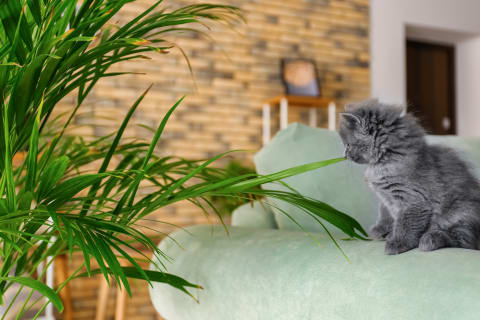Cats & Plants
Cats are generally pretty careful about what they eat, making cat poisoning emergencies quite rare. Nonetheless, cats can accidentally ingest toxic plant substances.
Sometimes cats that are around toxic plants get the seeds or pollen trapped in their paws or on their fur. Then, during their regular grooming the cat ingests the toxic substance, making them unwell.
Other-times cats are just being playful and begin nibbling the plants for fun. It can certainly be a challenge to keep houseplants out of a playful cat's reach.
If you have plants in your home and garden our Memphis area vets recommend that you take some time to learn the names of your plants, and research which of your plants are toxic to your cat..
Protecting Your Cat
Take a few minutes to check which plants are toxic to cats before bringing home a new house or garden plant.
If you own plants that are included on the list below, store your plant in a room that your cat can't get in to, or even better, consider giving your plants to a friend who doesn't have a cat.
If your cat does happen to ingest a toxic or poisonous plant substance, knowing the plant's name will help your vet to treat your cat quickly and with fewer tests.
Toxic Plants for Cats
If you notice your cat or kitten eating any plant that you're unsure of, call your vet. When it comes to your cat's health it's always better to err on the side of caution.
Here are a few of the most common plants that are toxic to cats:
- Amaryllis
- Autumn Crocus
- Azaleas and Rhododendrons
- Castor Bean
- Chrysanthemum
- Daffodils
- Dieffenbachia
- English Ivy
- Hyacinths
- Kalanchoe
- Lily
- Lily of the Valley
- Marijuana
- Oleander
- Peace Lily
- Pothos, Devil’s Ivy
- Sago Palm
- Spanish Thyme
- Spring bulbs
- Tulip
- Yew
Perhaps the most dangerous plant to cats is the lily. Lilies can cause kidney failure in cats who ingest the pollen, (frequently while grooming the pollen from their fur).
NOTE: Lily poisoning can be fatal in cats. If you suspect that your cat has come in contact with lilies, contact your Bartlett vet as soon as possible.Signs & Symptoms of Poisoning in Cats
The signs and symptoms of poisoning can vary greatly depending on the plant species that has been ingested.
- Irritants may cause symptoms such as: irritation around the mouth, itchiness, swelling, and red or watery eyes.
- Gastrointestinal symptoms of poisoning may include: vomiting and diarrhea.
- Severe symptoms of poisoning may include: breathing difficulties, irregular heartbeat, weakness, drooling, difficulties swallowing, excessive drinking, and frequent urination.
What To Do If Your Cat Has Been Eating Plants
Contact your vet immediately if you spot your cat nibbling on a plant that you are unsure of, or if your cat is showing any of the symptoms listed above.
Before heading to the vet:
- Remove any bits of plant from around your cat's mouth, paws, or fur then move your cat to a cat carrier, or a safe, confined space away from the plant, while you get ready to go to your veterinary clinic.
- Try to identify the plant that your cat has ingested, then call your vet. If it's after your vet's regular office hours, please call the emergency vet's office for assistance. Stay calm, let them know what has happened, and request an appointment as soon as possible.
- When you head to the animal hospital, take along a sample of the plant to show your vet, or if you are unsure which plant your cat has been eating take in a sample of your cat's vomit containing the plant substance.
Diagnosis of Plant Poisoning in Cats
Starting treatment right away may decrease recovery time or even save a life. When it comes to diagnosis and treatment of cat poisoning, being able to identify the plant that your cat has ingested will give your vet a vital head start.
If you are unable to identify the plant that your cat has ingested, or supply a sample of the plant matter, your vet will need to run a series of tests to identify the type of poison ingested before treatment can begin.
If you suspect that your cat has ingested a toxic substance, please contact our Bartlett Animal Hospital or go to your nearest emergency veterinarian clinic immediately.

Looking for a vet in Memphis?
We're always accepting new patients, so contact our veterinary hospital today to book your pet's first appointment.Related Articles View All
Heimlich Maneuver For Dogs: What To Do If My Dog Is Choking
What should you do if something gets lodged in your dog's throat and they begin to choke? Here, you will find helpful information on the Heimlich maneuver for dogs and what to do if your dog is choking.
Signs That Your Dog May Have a Cavity
Can dogs get cavities? What are the signs of cavities in dogs? In today's post, you will find the answers to these dog cavity questions and more.
How can I help my dog with allergic dermatitis feel better?
Our Bartlett vets often see dogs with skin issues caused by allergens. In today's post, we discuss the different causes of allergic dermatitis, signs of dog skin allergies, and how this condition can be treated.
Periodontal Disease in Dogs - Symptoms & How It's Treated
Healthy teeth and gums play an important role in your dog's overall health, but many dogs don't receive the dental care they need to prevent oral health problems from arising. Our Bartlett vets explain.
